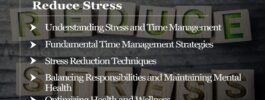Introduction
Time management is crucial for working professionals in today’s fast-paced world. With numerous tasks, deadlines, and responsibilities, it can be challenging to effectively manage one’s time. However, with the right strategies and techniques, professionals can enhance their productivity and efficiency. In this article, we will discuss the top time management tips for working professionals to help them optimize their time and achieve their goals.
1. Set Clear Goals
One of the essential aspects of effective time management is setting clear goals. Define what you want to achieve in both the short and long term. Break down your goals into smaller, actionable steps to make them more manageable. Having a clear direction will help you prioritize tasks and allocate your time wisely.
2. Prioritize Tasks
Not all tasks are created equal. It’s crucial to prioritize your tasks based on their urgency and importance. Use techniques like the Eisenhower Matrix to categorize tasks into four quadrants: urgent and important, important but not urgent, urgent but not important, and neither urgent nor important. Focus on completing tasks in the first two quadrants first to maximize productivity.
3. Create a Schedule
Develop a daily or weekly schedule to organize your tasks and activities. Allocate specific time slots for different tasks, including work assignments, meetings, breaks, and personal activities. Stick to your schedule as much as possible to maintain consistency and discipline in your routine. Use tools like calendars, planners, or productivity apps to help you stay organized.
4. Avoid Multitasking
While multitasking may seem like a way to get more done in less time, it often leads to decreased productivity and increased errors. Focus on one task at a time to give it your full attention and produce high-quality results. Prioritize tasks based on their importance and devote dedicated time to each task without distractions.
5. Learn to Say No
As a working professional, you may face numerous requests for your time and attention. It’s essential to learn to say no to tasks or commitments that do not align with your goals or priorities. Politely decline requests that may derail your focus or overwhelm your schedule. By setting boundaries and saying no when necessary, you can protect your time and energy for tasks that matter most.
6. Delegate Tasks
Delegation is a valuable skill for effective time management. Identify tasks that can be outsourced or assigned to others, whether colleagues, team members, or external resources. Delegating tasks not only frees up your time for more critical responsibilities but also empowers others to develop their skills and contribute to the team’s success.
7. Take Breaks
Working continuously without breaks can lead to burnout and reduced productivity. Incorporate short breaks into your schedule to rest and recharge. Use techniques like the Pomodoro Technique, which involves working for a set period (e.g., 25 minutes) followed by a short break, to maintain focus and productivity throughout the day.
8. Limit Distractions
Identify and minimize distractions that hinder your productivity. This may include turning off notifications on your phone, setting specific times for checking emails, or creating a designated workspace free from distractions. By creating a conducive environment for work and limiting interruptions, you can improve your focus and efficiency.
9. Review and Adjust
Regularly review your time management strategies and assess their effectiveness. Identify areas where you can improve or optimize your workflow. Be open to adjusting your approach based on feedback and results. Continuously strive to enhance your time management skills to achieve better outcomes and maintain work-life balance.
10. Practice Self-Care
Lastly, remember to prioritize self-care to maintain your overall well-being and productivity. Get an adequate amount of sleep, exercise regularly, eat healthily, and engage in activities that help you relax and unwind. Taking care of your physical and mental health is essential for sustaining your energy levels and performance as a working professional.







